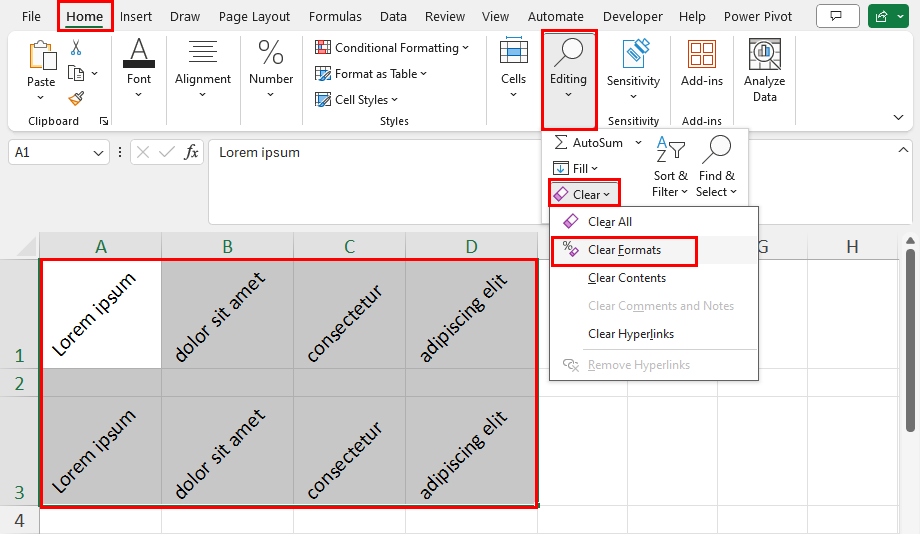If you want to give a fresh look to column headers of your Excel worksheet by rotating text, read this ultimate tutorial that explains how to rotate text in Excel in various ways.
Microsoft Excel comes with elegant object visualization tools to make your reports creative, presentable, and professional. One such tool is the text orientation tool within a 2-D and 3-D space.
If you’re not familiar with the process, no worries—I’ll guide you through it. Below, I’ll outline different methods, catering to various skill levels in Excel, so you can choose the approach that aligns with your expertise, whether you’re a beginner or an advanced user.
Reasons to Rotate Text in Excel
Here are the situations and reasons why you might want to rotate texts in Excel:
- Rotating text allows you to fit longer labels or headers into narrow columns without compromising readability.
- Text rotation can also enhance the visual appeal of your Excel sheets by providing a more dynamic layout.
- You can use rotated text to emphasize column or row headings, making them stand out more prominently.
- You can use rotating texts in dashboards to present information at an angle, aiding in better data visualization.
- In some languages, symbols, or characters are traditionally written vertically. Rotating text allows for proper representation.
- When working with time series data, rotating text can be useful to display dates or time intervals along the axis.
📚 Read More:
Rotate Text in Excel Using Shortcut Keys
This is a quick method to change the rotation of texts in Excel worksheet cells in bulk or selectively. You can select one cell, multiple non-adjacent cells, and a cell range and follow the instructions below to rotate texts:

Press the following keys in the order indicated by the right-pointing arrows to rotate texts clockwise.
Alt > H > FQ > L
Find below other key combinations you can use in place of L (clockwise):
Alt > H > FQ > O (rotate counter-clockwise)
Alt > H > FQ > V (rotate vertically)
Alt > H > FQ > U (rotate upwards)
Alt > H > FQ > D (rotate downwards)
Rotate Text in Excel Using the Orientation Command
If the above shortcut keys don’t work for you, try interacting directly with the Orientation command, and the Excel ribbon button to rotate text.

Highlight the text you want to rotate and go to Home > Alignment. There, you should see the Orientation button just above the Decrease Indent command. Click the Orientation drop-down arrow.
On the Orientation drop-down list, you should see various ways to rotate the selected texts, like Angle Counterclockwise, Angle Colckwise, etc. Click on any of these options to rotate the text orientation.
Use the Quick Access Toolbar for Quick Access
If you often use the Orientation command on Excel via keyboard shortcuts, you should add the command in the Quick Access Toolbar (QAT).

The shortcut to any QAT command is fairly simple than others in Excel. You just press the Alt key and the serial number of the command, like 5 for the Orientation command on my Excel software. It could be different on your Excel desktop app.

To include the Orientation command, click on the File tab of your Excel workbook and choose More > Options. The Excel Options dialog will show up.

There, select the Quick Access Toolbar category from the left-side panel and switch to the Home tab for the Choose commands from list. Scroll down to find Orientation, select it, and click the Add button to include the command in the right-side menu. Click OK to save the changes you made.

Now, highlight any text you want to rotate, and press the shortcut for the QAT Orientation command, for example, Alt + 5, to choose a quick text rotation option.
Rotate Text in Excel Using Using the Format Cells Tool
The methods you tried so far only offer fixed text rotation options. If you want a custom angle, you need to use the Format Cells tool. It offers an extensive list of text alignment options like horizontal text alignment, vertical text alignment, text controls, text directions, and angled text orientations.

Select the texts you want to rotate in your Excel worksheet and press the Ctrl + 1 keys to launch the Format Cells dialog.

You should be in the Number tab of Format Cells. Navigate to the Alignment tab. For text rotation, you mostly need to use the Orientation panel. It has an angle setting panel. Click on the Text line and move the mouse cursor from top to bottom or bottom to top to change the text angle. Click OK to implement the new text orientation in your worksheet.
Rotate Text in Excel Using WordArt
WordArt enables you to add stylish text to your Excel worksheet. If you have added text using this tool but don’t know how to rotate the text to enhance visual appeal, follow the steps mentioned below.

Click on the WordArt text box and right-click to bring up a context menu. There, click on the Format Text Effects option.

The Format Shape panel will show up on the right side of the worksheet. Also, Excel will automatically select the Text Options menu on Format Shape.

To try a 2-D text rotation, go to the Text Box menu and click on the Text direction drop-down menu. Choose a text rotation style from the four available options in the list.

For a 3-D text rotation, you need to navigate to the Text Effects menu of Format Shape. Click on the 3-D Rotation menu to expand its options. Click on the Presets box and choose a 3-D rotation of your choice.
Rotate Text in Excel of a Text Box
When you create macro buttons or dashboard items, you often use the Text Box tool in Excel. If you want to rotate the texts you write on a Text Box but don’t know how I’ll show you below.

Highlight the Text Box you added to your worksheet and right-click. On the contextual menu, click on the Format Text Effects option.


The Format Shape menu will open on the right-side edge of the Excel app. From here, you can apply 2-D and 3-D text rotation to Text Box content. Just follow the steps mentioned earlier in the WordArt section to rotate texts in this Text Box.
Rotate Text in Excel Using the Chart Formatting Tools
Another place where you can have texts and need to rotate those is an Excel chart. There are various text elements on an Excel chart. Among many options, you mostly need to change the rotation of texts that appear on the X-axis series, Y-axis series, chart data labels, chart legends, and chart titles.

Suppose, you want to change the X-axis series labels. Click on the chart axis label text to select all. Now, you can follow the previously mentioned steps to change text orientation using the options available in Format Axis > Text Options > Text Box.

Now, instead of using the Text direction drop-down menu which has limited text rotation options, you can use the Custom angle box. Enter a value for the orientation angle or use the arrows to get the rotation angle you’re looking for.
Rotate Text in Excel Using Excel VBA
A quick way to intuitively change the text orientation angle is Excel VBA macro. It allows you to automate the whole process of selecting a cell range, going to the Orientation command, and selecting a text orientation angle.
Below, I’m sharing a VBA script to automate text rotation. The macro will ask you to enter the cell reference and orientation angle. The orientation angle must range from +90 to -90. You just enter the values between this range, no need to use the degree symbol in the input box.
Sub RotateText()
Dim selectedRange As Range
Dim rotationAngle As Double
Dim cell As Range
' Select cells using input box
On Error Resume Next
Set selectedRange = Application.InputBox("Select cells to rotate", Type:=8)
On Error GoTo 0
' Exit if user clicks Cancel
If selectedRange Is Nothing Then
Exit Sub
End If
' Get rotation angle from user
On Error Resume Next
rotationAngle = Application.InputBox("Enter rotation angle (in degrees)", Type:=1)
On Error GoTo 0
' Exit if user clicks Cancel or enters a non-numeric value
If rotationAngle = 0 Then
Exit Sub
End If
' Rotate text in the selected range
For Each cell In selectedRange
If Not IsEmpty(cell.Value) Then ' Check if the cell is not empty
cell.Orientation = rotationAngle
End If
Next cell
End Sub
Here’s how you can use the above script to create a VBA macro:

Go to the Developer tab and click on the Visual Basic button to launch the Excel VBA Editor tool. There, click on the Insert button and choose Module.

Within the blank module, copy and paste the above-mentioned script. Click the Save button and hit No to bring up the Save As dialog box.

On the Save As dialog, click the Save as type drop-down and choose Excel Macro-Enabled Workbook (XLSM) file type. Click the Save button to save the macro.

Now, press Alt + F8 to launch the macro dialog and choose the RotateText macro. Hit Run to execute the macro.

Choose a cell range that contains texts.

Also, enter an angle of orientation.

You should see that Excel changed the text rotation angle according to the orientation you selected in the macro.
Note: Before using this macro, save your workbook. You won’t be able to undo any changes made using a VBA script.
Rotate Text in Excel Using Office Scripts
You can use an Office Scripts script when you’re creating advanced Excel automation using Power Automate and Office Scripts and need to rotate texts in Excel. This feature is only available when you use Microsoft 365 Business Standard or a better subscription.

Go to your worksheet containing the texts and click on the Automate tab. There, go to the Scripting Tools block and click on the New Script button. This will open the Office Scripts Code Editor on the right edge of the Excel desktop app.

Copy and paste the following script inside the Code Editor panel and click on the Save script button. Now, highlight a cell or a cell range and click the Run button to execute the script.
function main(workbook: ExcelScript.Workbook) {
const activeWorksheet = workbook.getActiveWorksheet();
const selectedRange = workbook.getSelectedRange();
// Access the format object correctly
selectedRange.getFormat().setTextOrientation(45);
}Excel will automatically rotate the texts according to the angle of orientation mentioned in the Office Scripts script.
If you want to get a different angle of orientation, you can enter that in the code element setTextOrientation(45) of the script. For example, to get a 50° angle, use this code element setTextOrientation(50).
How to Undo Text Rotation in Excel
Usually, you need to reverse the steps you’ve taken to undo the text rotation.

For example, if you’ve used the Orientation button to get the Angle Counterclockwise text rotation, you need to click the same button to return the texts to their original format.
If you don’t know the method of implementing text rotation, undoing the orientation angle could be a challenge. Here comes the Clear command in Excel.

Simply highlight the texts from which you want to remove custom angle orientation. Now, go to the Editing commands block on the Home tab and click on the Clear drop-down menu. There, select the Clear Formats option to undo text rotation instantly.
Conclusions
Mastering the skill of rotating text in Excel can significantly enhance your Excel worksheet presentation and improve overall data visualization. By exploring the various techniques outlined in this blog, from using the basic text rotation options to employing custom angles and orientation, you have unlocked a range of tools that can make your data more accessible and aesthetically pleasing.
Comment below if the article helped or if you’ve got feedback regarding the article.
 👉 Find out more about our Advanced Formulas course!
👉 Find out more about our Advanced Formulas course!




Very good, Bipasha. I knew the bare bones of that as I have been using =REPT() for many years but the rotation and resizing by % are a good addition to this